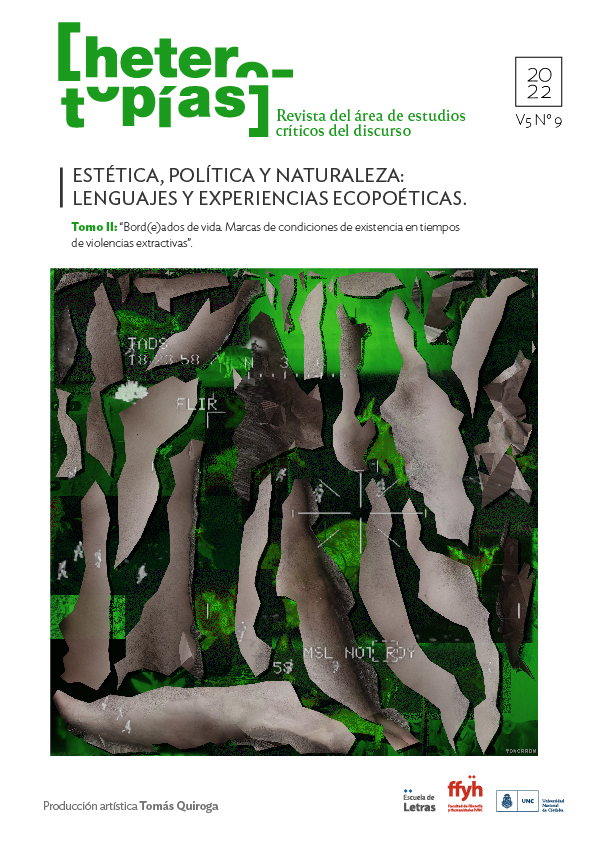Poetry and Litoral. Subjects, affectivity and landscapes
Main Article Content
Abstract
The poetics of the Litoral in the second half of the 20th century have had and still have a strong impact on the national and Latin American literary field. Through perception, contemplation and life experience in space, different modes of configuration have been generated with respect to nature and landscape, constituting a central topos in the literary system. Furthermore, this landscape -in concrete and material terms- serves as a setting in which the personal and affective relationships between the authors form an amalgam of networks where poetry and friendship merge with gestures of continuity and aesthetic ruptures.
The purpose of this work is to trace a route of key authors of the Litoral region -Juan L. Ortiz, Saer, the objectivist poets of Rosario from the 90s, until reaching the recent productions, Cecilia Moscovich and Daiana Henderson-. The objective is to investigate the ways in which representations of nature and subjective construction are configured in relation to said environment, at the same time as to attend to the ecological, environmental and political consequences that each aesthetic proposal concerns. From the comparative study, the aim is to answer the central question that structures this work: how do we get from a sacred landscape, linked to the idyllic in Juan L. Ortiz, with symbolist characteristics, although stained with injustices, to a landscape where the same nature is corrupted?
Downloads
Article Details

This work is licensed under a Creative Commons Attribution-NonCommercial-ShareAlike 4.0 International License.
Those authors who have publications with this journal, accept the following terms: Those authors who have publications with this journal, accept the following terms:
a. The authors will keep their copyright and guarantee to the journal the right of first publication of their work, which will be simultaneously subject to the Creative Commons Attribution - Non-Commercial - Share Alike (by-nc-sa) Attribution License; no commercial use of the original work or any derivative works is allowed, the distribution of which must be done with a license equal to the one that regulates the original work.
b. Authors may adopt other non-exclusive license agreements for the distribution of the published version of the work (e.g., deposit it in an institutional telematic archive or publish it in a monographic volume) provided that the initial publication in this journal is indicated.
c. Authors are allowed and recommended to disseminate their work through the Internet (e.g. in institutional telematic archives or on their website) before and during the submission process, which may lead to interesting exchanges and increase the number of citations of the published work. (See The effect of open access).
How to Cite
References
Aguirre, O. (2003). Daniel García Helder. Episodios de una formación (reportaje). En Punto de vista, XXVI (77), pp. 19-26.
Alzari, A. (2012). Introducción. En Ortiz, Juan L. Estas primeras tardes… y otros poemas para la revolución. Rosario: Serapis.
Andermann, J. (2018). Tierras en trance. Arte y naturaleza después del paisaje. Santiago de Chile: Metales Pesados.
Casas, F. (2010). Boedo. Todos los poemas. Buenos Aires: Eloísa Cartonera.
Clough, P. (2010). The affective Turn. En Gregg, M y Seigwhorth, G (eds). The affective Theory Reader. Durham: Duke UP.
De Certeau, M. (2000). La invención de lo cotidiano. D.F.: Instituto Tecnológico y de Estudios Superiores de Occidente.
Freidemberg, D. (1988). Dos lecturas sobre La reconstrucción del hecho de Edgardo Russo. En Diario de poesía, (10), p. 36.
García Helder, D. (1997). Tomas para un documental. Punto de vista, (75), pp. 1-5.
García Helder, D. (2007) Aspectos materialistas en la poesía argentina. Cahiers de LI.RI.CO 3. Recuperado de https://doi.org/10.4000/lirico.780
Garramuño, F. (2019). La vida anónima. Diálogos, interferencias e impropiedad en Carlos Cociña, Marília Garcia y Edgardo Dobry. El jardín de los poetas. Revista de teoría y crítica de poesía latinoamericana, (9), 5, pp. 40-53. Recuperado de https://fh.mdp.edu.ar/revistas/index.php/eljardindelospoetas/article/view/3809
Gramuglio, M. T. (2020). El lugar de Saer. Veinte episodios de la historia de la literatura argentina del siglo XX. EPUB. Rosario: EMR.
Guillén, C. (1989). Paisaje y literatura, o los fantasmas de la otredad. Actas del X Congreso de la Asociación Internacional de Hispanistas, Barcelona. Recuperado de https://dialnet.unirioja.es/servlet/articulo?codigo=594660
Henderson, D. (2012). El gran dorado. Rosario: Ivan Rosado.
Laguna, F. (2018). La princesa de mis sueños. Rosario: Ivan Rosado.
Lezcano, W. (30 de agosto de 2013). La fe del poeta. Entrevista a Daiana Henderson. Recuperado de: https://www.eternacadencia.com.ar/blog/contenidos-originales/entrevistas/item/la-fe-del-poeta.html
Litvan, V. (2011). “A medio borrar” en el origen: de Saer a Saer. Cuadernos LIRICO, 6, pp. 143-158.
Moscovich, C. (2021). Desmontar una casa. Rosario: Neutrinos.
Ortíz, J., L. (2005). Obra completa. Santa Fe: Universidad Nacional del Litoral.
Páez, R. (2013). Poéticas del espacio argentino: Juan L. Ortiz y Francisco Madariaga. Buenos Aires: Mansalva.
Porrúa, A. (2011). Caligrafía tonal. Buenos Aires: Entropía.
Prieto, M. (1999). Escritura de la zona. Historia crítica de la literatura argentina, 10. Buenos Aires: Emecé.
Prieto, M. (2006). Breve historia de la literatura argentina. Buenos Aires: Taurus.
Prieto, M. (2014). Natural. Bahía Blanca: VOX.
Retamoso, R. (1995). Los poetas de Santa Fe. La dimensión de lo poético. Rosario: Héctor Dinsmann.
Sarlo, B. (2011). Prólogo a la edición en español. En Williams, R. El campo y la ciudad. Buenos Aires: Paidós.
Sarlo, B. (2016). Zona Saer. Santiago de Chile: UDP.
Saer, J., J. (2006). La mayor. Buenos Aires: Seix Barral.
Saer, J., J. (2000). El arte de narrar (1960-1987). Madrid: Visor.
Taborda, O. (2017). 40 Watt. Rosario: Neutrinos.
Yuszsczuk, M. (2011). Lecturas de la tradición en la poesía argentina de los noventa. (Tesis de posgrado). La Plata: Universidad Nacional de la Plata.
Yuszsczuk, M. (2015). Belleza y Felicidad en la vorágine del 2001: algunas percepciones contemporáneas sobre las condiciones de un arte político. Orbis Tertius, 20(21), pp. 21–29.
